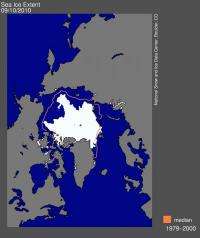Arctic sea ice shrinks to third lowest area on record (Update)

Arctic sea ice melted over the summer to cover the third smallest area on record, US researchers said Wednesday, warning global warming could leave the region ice free in the month of September 2030.
Last week, at the end of the spring and summer "melt season" in the Arctic, sea ice covered 4.76 million square kilometers (1.84 million square miles), the University of Colorado's National Snow and Ice Data Center said in an annual report.
"This is only the third time in the satellite record that ice extent has fallen below five million square kilometers (1.93 million square miles), and all those occurrences have been within the past four years," the report said.
A separate report by the National Oceanic and Atmospheric Administration (NOAA) found that in August, too, Arctic sea ice coverage was down sharply, covering an average of six million square kilometers (2.3 million square miles), or 22 percent below the average extent from 1979 to 2000.
The August coverage was the second lowest for Arctic sea ice since records began in 1979. Only 2007 saw a smaller area of the northern sea covered in ice in August, NOAA said.
The record low for Arctic sea ice cover at the end of the spring and summer "melt season" in September, was also in 2007, when ice covered just 4.13 million square kilometers (1.595 million square miles).
Mark Serreze, director of the NSIDC, said climate-change skeptics might seize the fact that Arctic sea ice did not hit a record-low extent this year, but said they would be barking up the wrong tree if they claimed the shrinkage had been stopped.
"Only the third lowest? It didn't set a new record? Well, right. It didn't set a new record but we're still headed down. We're not looking at any kind of recovery here," he told AFP.
In fact, Serreze said, Arctic sea ice cover is shrinking year-round, with more ice melting in the spring and summer months and less ice forming in the fall and winter.
"The Arctic, like the globe as a whole, is warming up and warming up quickly, and we're starting to see the sea ice respond to that. Really, in all months, the sea ice cover is shrinking -- there's an overall downward trend," Serreze told AFP.
"The extent of Arctic ice is dropping at something like 11 percent per decade -- very quickly, in other words.
"Our thinking is that by 2030 or so, if you went out to the Arctic on the first of September, you probably won't see any ice at all. It will look like a blue ocean, we're losing it that quickly," he said.
Losing sea ice cover in the Arctic would affect everything from the obvious, such as people who live in the far north and polar bears, to global weather patterns, said Serreze.
"The Arctic acts as a sort of refrigerator of the northern hemisphere. As we lose the ice cover, we start to change the nature of that refrigerator, and what happens up there affects what happens down here in the middle latitudes," he said.
"We might have less cold outbreaks, which you might say is a good thing, but it's not such a good thing in regions that depend on snowfall for their water supply."
NOAA noted in its report that the first eight months of 2010 were in equal first place with the same period in 1998 for the warmest combined land and ocean surface temperatures on record worldwide, and the summer months were the second warmest on record globally, after 1998.
(c) 2010 AFP



















